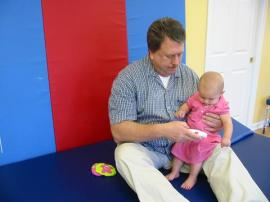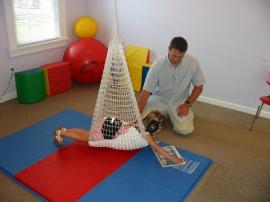Services
Pediatric Physical Therapy
Physical Therapists are professionally educated at the college or university level to provide services to patients who have impairments, functional limitations, disabilities, or changes in
physical function and health status resulting from injury, disease, or other causes
At C.H.A.T.S. we examine, evaluate, and establish a diagnosis and a prognosis to determine the most appropriate intervention(s) to address the outcomes of children of all ages with injuries and
diseases.
Pediatric Occupational Therapy
Occupational Therapists are trained to assist people of all ages with their functional performances in daily living activities.
Pediatric occupational therapy helps children succeed at and accomplish their developmental milestones on a physical, cognitive, social, emotional, and behavioral level. We help children reach their potential in their day-to-day lives at home, school, play and with self care.
In order to achieve this we utilize comprehensive assessment tools and screenings and then implement appropriate multi-sensory treatment protocols.
Many of the children referred for occupational therapy at C.H.A.T.S. demonstrate difficulty processing sensory input. We have advanced training in assessing and treating sensory processing and sensory integration disorder.
In addition, we evaluate and treat children who have:
- Attention Deficit Disorder
- Autism
- Pervasive Developmental Disorder
- Neurological Impairments
- Brachial Plexus Injuries
- Upper Body Extremity Orthopedic Conditions
- Developmental Delay (Decreased Fine Motor Skills)
- Handwriting Difficulties
Services Offered:
- Sensory Integration Treatment
- Neurodevelopmental Treatment
- Post-Trauma Rehabilitation
- Fine Motor Training
- Visual Motor Therapy
- Visual Perceptual Therapy
- Handwriting Programs
- Self-Care Training
Specialized Programs
Therapeutic Listening - Therapeutic Listening is part of an individually designed treatment program administered by an occupational therapist. During treatment the client listens to specifically
designed music while involved in other therapeutic activities. The music may be filtered to activate certain harmonics for specific therapeutic purposes. It can help to improve attention, behavioral
and emotional regulation, and sensory modulation. Performed in the clinic and at home.
The Alert Program for Self Regulation (How Does Your Engine Run) - A program that helps to build a child's attention and focus and provides strategies to help promote a calm, focused arousal
state.
Sensory Diets - A home-based program that provides activities to help meet a child's sensory needs. This diet includes purely physical components that help with self regulation, thus allowing for
optimal functioning
Interactive Metronome - A computer based lesson that helps build a child's ability to focus, motor plan, and sequence.
Handwriting Without Tears - A systematic program that teaches proper writing skills.
What is Sensory Integration?
Sensory Integration relates to the ability of the nervous system to organize and modulate certain sensory functions, allowing individuals to perform in everyday situations. All day we receive information from our senses; tactile (touch), auditory (hearing), visual (sight), gustatory and olfactory (taste and smell), proprioception (body awareness) and vestibular (movement and balance). Our brains must organize all this information so we can function successfully in our daily lives.
When there is a disruption in sensory processing the following can occur: sensory defensiveness, problems with self-regulation, and difficulty conceiving, organizing and executing skills of all kinds.
The following concerns may be present:
- Fussy, colicky as a baby
- Restless when held, difficult to console
- Difficulty with regulating sleep/wake cycle
- Oversensitive to stimulation - overreacts to sounds, touch, taste, and odors
- Slow to meet developmental milestones (roll over, crawl, sit, stand, walk)
- Clumsy, falls frequently
- Difficulty learning new motor skills
- Is too forceful when handling objects, writing, coloring or interacting with others
- Acts impulsive
- Angers easily
- Displays short attention span
- Overly dependent on schedules and routines; becomes upset with changes
- Displays unpredictable behavior in social situations
- Difficulty with handwriting skills
- Behavior issues at school
- Strong dislike for baths, haircuts, nail cutting
- Picky eating
- Difficulty making friends
- Avoids playground activities and/or participation in sports
- Lack of enjoyment of age appropriate motor activities; climbing, jumping, swinging, drawing, cutting, writing, assembling
If your child presents with difficulty in several of these areas, an occupational therapy evaluation may be needed.



